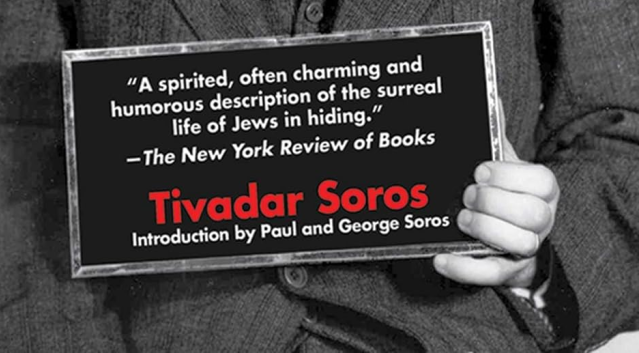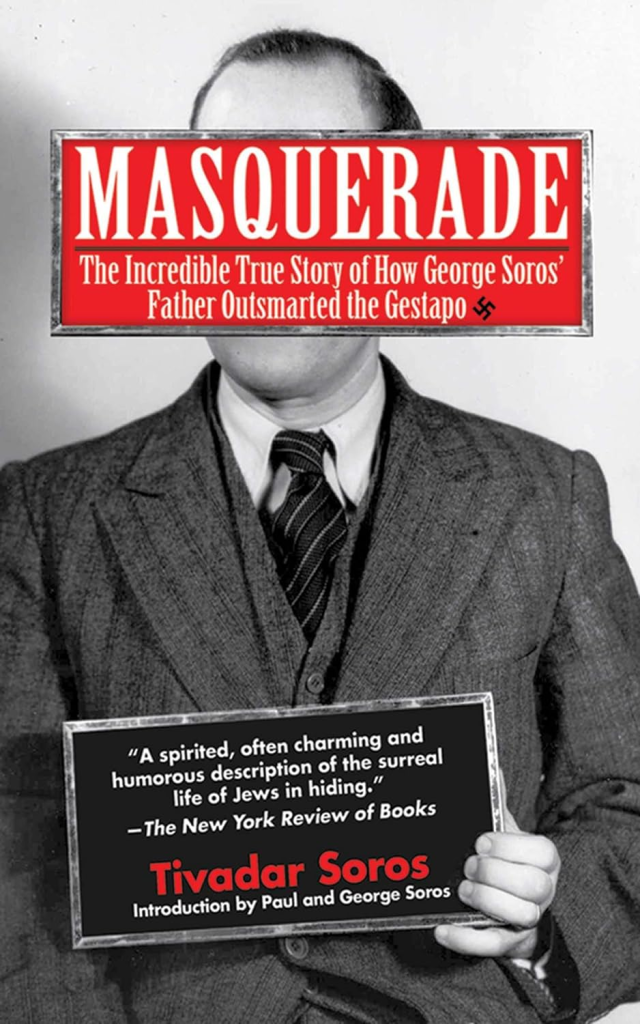

This is the first in what I hope will be an occasional series about people who seemed to know something about living. Today’s subject is Tivadar Soros, author of Masquerade, a firsthand account of WWII years in Hungary. Who was Tivadar Soros? He was a Jewish Hungarian lawyer, WWI veteran, husband and father (of George and Paul Soros), Esperanto enthusiast, and an incredibly interesting and heroic figure during WWII. Tivadar Soros was a man with remarkable sangfroid, who never lost his joie de vivre, even in the darkest years.
Masquerade reveals aspects of the war we often don’t get from our familiar narratives. Tivadar was a middle-class man with a family who realized immediately that his family needed to go into hiding in order to survive. As the storm clouds gathered, he and his wife moved to separate residences, under assumed identities. His two children, neither very old, did the same. Tivadar also had to make accommodations for his mother-in-law. And soon he was operating in the shadows.
Tivadar’s quick thinking was remarkable. He knew right away to go into hiding and he was prepared to do it quickly. Many people did not split up their families and did accept new legislation and turned to the Jewish Council for help. They weren’t prepared to move so fast and in such extreme directions. In Masquerade, Soros writes that, “in times of danger, the biggest problem is getting people to choose among unpleasant options.” It’s not easy to leave a home behind. According to Soros, “middle-class existence holds us by a thousand and one ties. Our homes, our furniture, pictures on the wall–these are all insignificant in themselves, but most people can’t break free of them.” Neither is it easy to leave your children with other people.
Tivadar also confronted “the moral problem of breaking the law.” In no time, Tivadar was working with forgers. He secured fake documents for himself and others. Some people might have struggled more with breaking the rules. He believed that “the citizen should not accept injustice or arbitrariness from the state to which he belongs. If his life is endangered by an unjust action of the state, he is morally justified in fighting back. He even has a legal justification in the principle of self-defense in extreme need.” He had an ability to step outside of the norms and evaluate his situation.
Tivadar’s assistance to others soon greatly exceeded his inner circle. Along with his family, he helped friends and associates secure documents and hiding places. But then he began helping very distant connections and even strangers. He took tremendous risks. At one point he opened up about his struggles to a woman he did not know, only to have her share her story of evading the Nazis. He writes: “I was startled. She began telling me all her troubles. Suddenly our roles were reversed: I had hoped for her sympathy, but now it was my turn to console her. I had taken a big risk in revealing my Jewishness to a stranger, but without risks we gain nothing. Without risks, there’s no life.”
Tivadar was not cowed by risk, but he was also motivated by principle. He believed that “all of us have an obligation to help the helpless when their human rights are violated and when atrocities are perpetrated against them.” And so he aided friends of friends and people he met in cafés and on the street. In a passage explaining his behavior, he writes:
“If anyone asked for my help, one of my principles in life was never to say no–if only to avoid diminishing their faith in human beings. I felt that I was just a little responsible for everyone. My willingness to help was sincere, but my prudence dictated certain limits. I never refused a loan, not even when my funds were low, though sometimes, as a sign of good intentions, I had to give only part of the money requested. I tried always to exercise common sense and to stay within realistic boundaries.
I wanted my sons to understand this principle, too. I explained it to them like this: ‘Whenever the anticipated results exceed the energy or sacrifice involved, you’ve got to help. Don’t shrink from sacrifice if it means more to the recipient than the effort you have to put into it.’”
Over the course of the conflict, Tivadar had to move many times. At one point he posed as a wine merchant and had to find enough wine to back up his cover. He had to move his family many times and help his older son Paul avoid being drafted. His mother-in-law was constantly putting herself and others at risk and required a great deal of special handling. Through it all he remained as optimistic as possible, listened to the BBC as much as he could, met with people, and made connections of all kinds.
All of this required tremendous courage. Tivadar had it. And remarkably he did not begrudge those who didn’t. Early on he asked a friend for help with false papers, but the friend was too afraid to help. Tivadar didn’t hold it against him. He writes, “Courage is an intangible quality that you either have or don’t have. If a coward tries to act like a hero, something is bound to go wrong. So I told him that under the circumstances he should definitely keep his papers, and thanked him for his good intentions. Since I admire people who have the courage to say they lack it, I accepted his decision without complaint.”
Tivadar Soros may have been prepared for these circumstances by his background and natural abilities. He was intelligent and sociable. He was also a veteran of the First World War. He had even been a POW in the Soviet Union and had escaped from Siberia with others–on foot! (He wrote a book about that, too. Crusoes in Siberia) And he had an interesting outlook on life. He worked as a lawyer but always emphasized time for his own leisure. He was the editor of the Esperanto journal Literatura Mondo. He was able to see things in ways that not everyone could.
Yet we can learn from Tivadar Soros’ example because he clearly operated on principles that can be adopted even if one hasn’t had experience escaping Siberia and knows nothing of Esperanto. Tivadar had, and demonstrated the value of, courage. Part of that courage included acting quickly and decisively, even before his opinions were validated by others. He was willing to think for himself. He embraced risk. As he said, “without risks, there’s no life.” This is not a philosophy we all live by. But his story is not just about individual survival, he helped all kinds of people, because he was driven by care for others. And in that care for others, he demonstrated sympathy, patiently bearing with the frailties of friends and family. These are virtues that we can cultivate, even in our less extreme circumstances.